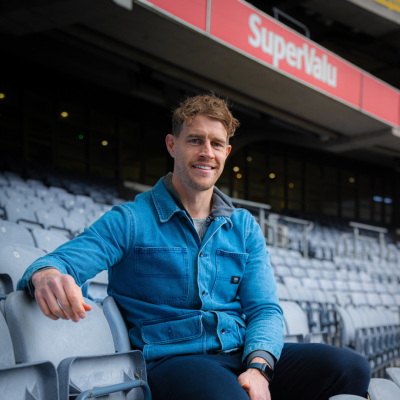Andrew Trimble: For Ulster and Ireland

Date Posted: February 12, 2024
Monday 12th February, 9.35pm
A 50-minute documentary presented by former Ulster and Ireland rugby player Andrew Trimble, produced for RTÉ by NPE Media, part-funded by Northern Ireland Screen’s Ulster-Scots Broadcast Fund.
Andrew Trimble looks into his family heritage and his experiences growing up in Northern Ireland, and considers how different factors and influences have shaped his sense of national identity.
Andrew looks at how a binary political, cultural and religious split formed in the region, and whether that has evolved since the Good Friday Agreement and more recent political turbulence. During the film, he meets people from very different backgrounds, including the offspring of political titans John Hume, Ian Paisley and David Trimble, and the former Antrim hurling captain, Neil McManus.
Andrew discovers how his own Ulster-Scots background shaped his life, and what impact his international rugby career had on his own outlook and identity.
___
Andrew Trimble retired from rugby in 2018 and has since enjoyed the freedom of living what he calls “a fuller life outside the rugby bubble”, working for his sports tech company, doing punditry work, and hosting a podcast with the former Munster and Ireland player, Barry Murphy.
He has found the space to think more deeply about his sense of identity and his Northern Ireland Protestant heritage and in 2021 took part in a studio discussion on Claire Byrne Live about the prospect of a United Ireland. Barry was very surprised to see Andrew’s participation in the show, since he had never heard Andrew talk about Northern Ireland politics, religion or identity before, despite them being close friends.
Barry was intrigued to discover that these issues were still “live” for Andrew and other Northern Ireland people, and that they have come more sharply into focus in recent years with the political backdrop of Brexit, the census results, the periodic collapse of Stormont and calls for a border poll.
Barry travels north and he and Andrew set out to learn more about the Ulster-Scots heritage of Andrew’s family and how this identity is still very important to lots of Northern Ireland people today.
Andrew looks back on his experiences playing for both Ulster and Ireland- wearing different jerseys equally proudly- and discovers how the nuance of a united cultural and national identity within that “rugby bubble” in Ireland was not consistent with the reality of a binary split that was exacerbated during the Troubles.
He goes to a Loyal Order band parade to learn more about how religious, cultural and national identity merge in how some Ulster-Scots see themselves, but also visits the predominantly nationalist hurling stronghold of Cushendall to see how the connection with Scotland is perceived very differently in some parts of the Glens of Antrim.
In an effort to understand how politics in Northern Ireland has been shaped by heritage, religion and cultural background, Andrew meets Professor Mo Hume and Reverend Kyle Paisley, the offspring of political icons John Hume and Ian Paisley, and is surprised to learn things about each leader’s identity that would have surprised their more ardent followers.
Andrew also spends time with Vicky Trimble whose father David was leader of the Ulster Unionist Party, a signatory of the Good Friday Agreement and a joint winner of the Nobel Peace Prize alongside John Hume. Vicky made headlines a few years ago when David made a speech in the House of Lords reflecting on how her wedding had forced him to change his views on gay marriage, and she has lots to say on the concept of identity and family heritage.
The film finishes in Croke Park, where Barry and Andrew reflect on the legacy of the match in 2007 when the GAA changed their rules about foreign games to accommodate a Six Nations clash with England. It was the most politically significant match of Andrew’s rugby career and thinking deeper about how that occasion was handled helps him to understand more about how his own twin identities of Ulster-Scot and Irishman can co-exist.



